#case in point: jonathan and mina
Explore tagged Tumblr posts
Text
You know what I realized? I might actually like romance stories if people just freaking wrote them well!
Like if they were just actually cute, compelling, realistic, and NOT straight up problematic and creepy half the time
#case in point: jonathan and mina#love their relationship so much#also “realistic” for ME as a demiromantic implies natural loooong slow burn#and i get (theoretically lol) that its not like that for everyone but at least let me see the relationship develop?#yall just met each other why are you kissing?#lol#or more about when character just do not have brains apparently and act completely irrationally#like Maria and Tony having sex right after HE MURDERED HER BROTHER#like um what?#and my roommates are like 'ohh such a sweet tragic romance'#WHAT?!#she's known him for two days and he just did a murder!#writing#romance#asexual#aspec#demiromantic#dracula#west side story#and many others you fill in the blank#romcoms
11 notes
·
View notes
Text
why does remmick seem like a little freak when other vampires have natural charm and appeal?
tl;dr — sinners challenges the audience’s preconceived notions of vampires by throwing one into an atypical setting, subverting audience expectations to create a fresh vampire story rooted in historical and societal realities
saw a post comparing remmick to other vampires in media, specifically how unlike most vampires, he freaks people out and doesn’t have this suave, unearthly charm… but here’s the thing. he isn’t the one they’re freaked out by. they were suspicious to begin with, because of the sociocultural atmosphere of the time
1. should be obvious why the black characters suspected him of foul play. most white people in 1930s Mississippi did not seek out black companionship. if a white person wanted to deal with black folks, there probably was some kind of nefarious ulterior motive — case in point, the klan guy selling the mill to smoke and stack.
2. the white people in the film had reasons to suspect remmick as well. 1932 set us smack dab in the immediate fallout of the stock market crash of 1929 — the Great Depression. things were rough, and it made desperate people so desperate things. people would walk up to a house claiming to need help, then rob the family blind and sometimes even kill them. for remmick to run up to a white couple’s home out of nowhere and beg for help… that would be a red flag. his offer of money and appeal to their racism helped smooth that over, but their immediate suspicions of him came from the desperate atmosphere of the times and their own struggle for survival. you can tell they’re not wealthy from the ramshackle appearance of their home and their simple clothes. they don’t want some vagabond to waltz in and kill them for what little they have.
3. this would require a much longer post to fully flesh out, but i would argue that remmick does have that otherworldly charm — just for the right kind of person. while most people are suspicious of remmick from the jump due to their experiences with racism, poverty, etc., mary is the one person who seemed to fall for his platitudes and charm… and i would argue it’s because of who she is.
stack tells us that mary has a rich white husband that owns a successful, lucrative farm. she has no need to worry about her livelihood or safety from strange white people. in fact, she is probably used to them kissing her ass because she’s rich, pretty and passes for white. remmick, bart and joan are just white people to her, and they show her empathy and compassion when they learn her mother passed away, which further disarms her. only when they begin exhibiting monstrous behavior (the drooling especially) does she really clock that they’re dangerous.
i bring this up because in a lot of media, vampires find success in charming others because they can relate to them. yes, they are depicted with glamoring powers that can draw people in, but think about the classics.
dracula targets jonathan harker after placing himself in a position of power over him, then goes to hunt mina and lucy, both members of higher society. they defer to him because he is a count — a powerful person societally. his strangeness is offset by their unwillingness to challenge or question his authority.
or perhaps a newer example — lestat and louis in the amc iwtv show. louis is less suspect of lestat early on because he has made a living from dealing with white people, playing to their position of power above him and deferring to them. lestat uses this to get close, then begins appealing to louis’ desire for power over the white men who disparage and control him. again we see that while it’s true that the vampire has an otherworldly charm, it’s their knowledge of power and societal dynamics that makes them effective
we don’t normally see poor white trash vampires, so it seems like remmick isn’t as successful at charming others, but really what’s happening is that the film is challenging our preconceived notions of what a vampire looks like by throwing one into an world that we normally wouldn’t find them in. vampires aren’t normally poor, wounded and hunted — they have power, money, influence and good looks.
that said, remmick still uses the same playbook as other vampires; he just has his work cut out for him, and has to navigate an inherently desperate, dangerous world in more calculated ways to protect himself. otherwise, he never would have had a chance in hell of getting close enough to the juke to achieve his goals. coogler did this on purpose. which is just another way this movie slaps major ass.
gahhhhhhhh this could be a whole paper and i’ll be damned if i don’t wanna write it
990 notes
·
View notes
Text
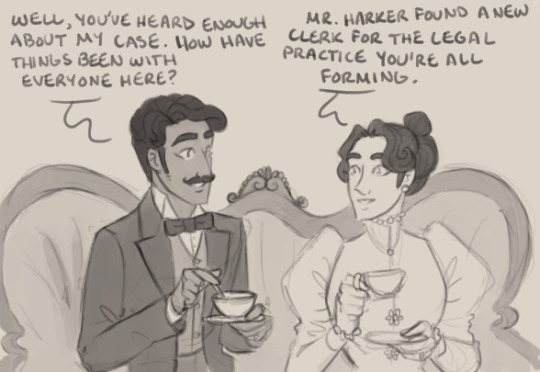

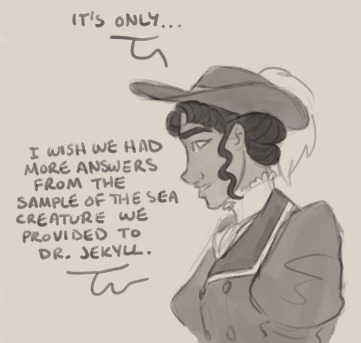
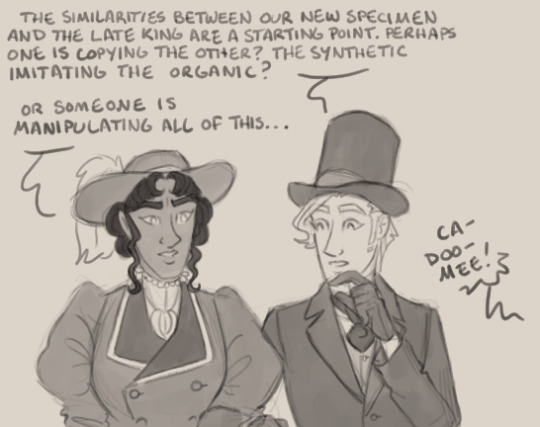
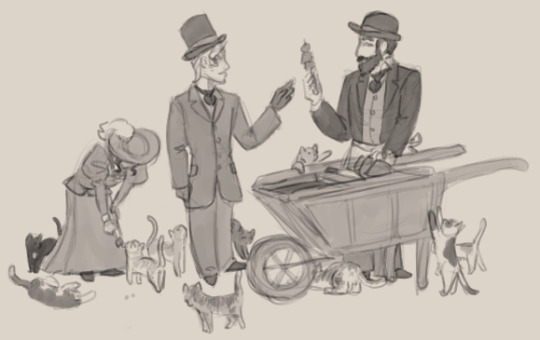
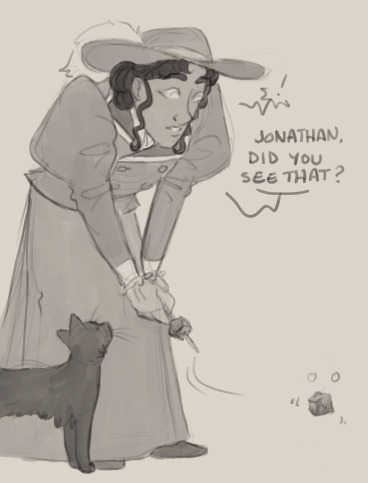
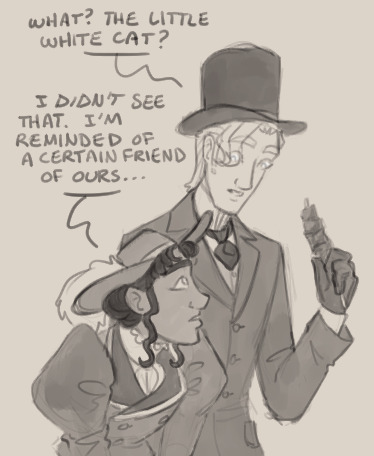
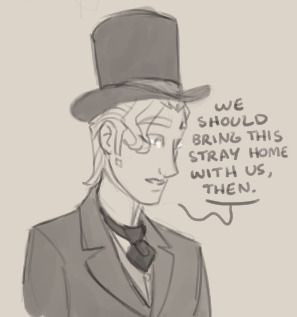
Credits for Interlude 2:
Art by @mayhemchicken-artblog
Story by @absolutely-and-always13
Edited by @dathen, @mayhemchicken-artblog, and @thegoatsongs
Image descriptions (alt text) by @thegoatsongs and @mayhemchicken-artblog
NOTE FROM THE TEAM: Ordinarily, we love to encourage people to read the works LXGF is based on. However, this interlude contains elements adapted from The Beetle by Richard Marsh, which we cannot in good consciousness recommend to anyone. Please do not read The Beetle; and should you do, please be warned that it is exceptionally (even for the 19th century) racist, misogynist, homophobic, transphobic, ableist, orientalist, and contains among other things victim blaming of male assault victims and graphic animal cruelty. No context from The Beetle will be necessary for your enjoyment of this interlude.
Previous page || Next page
Start reading Episode 1
Dialogue transcripts:
Panel 1
Godfrey: Well, you’ve heard enough about my case. How have things been with everyone here?
Irene: Mr. Harker found a new clerk for the legal practice you’re all forming.
Panel 2
Irene (offscreen): It will be nice to have three of you working together.
Godfrey (offscreen): Oh?
Jonathan: What’s troubling you, Mina?
Panel 3
Mina: It’s only…I wish we had more answers from the sample of the sea creature we provided to Dr. Jekyll.
Panel 4
Jonathan: The similarities between our new specimen and the late king are a starting point. Perhaps one is copying the other? The synthetic imitating the organic?
Mina: Or someone is manipulating all of this…
Cat's meat man (offscreen): Ca-doo-mee!
Panel 5
(n/a)
Panel 6
Mina: ! Jonathan, did you see that?
Panel 7
Jonathan: What? The little white cat?
Mina: I didn’t see that. I’m reminded of a certain friend of ours…
Panel 8
Jonathan: We should bring this stray home with us, then.
#lxgf#lxgf interlude 2#story updates#lxgf irene norton#lxgf godfrey norton#lxgf mina harker#lxgf jonathan harker#in addition to all of the above the beetle is also just not very good
222 notes
·
View notes
Text
Y'know, something that gets me, is that in the book, Dracula's intentional predation of Lucy starts off with an accidental meeting. Sure, Lucy slept walked, and an argument could be made her path might have been supernaturally influenced, but I say she'd already been a known sleep-walker, and she went directly to a place she was familiar with.
Her stumbling onto Dracula's hiding spot in a very vulnerable state was just an accident, and from there, he intentionally set out to harm her, and through that, everyone around her he could get.
This is sort of related to Jonathan, too. Had Mr. Hawkins not come down with a bad case of gout, Jonathan wouldn't have been sent to Castle Dracula in his stead. Sure, Dracula probably would have had his fun with Hawkins before inevitably killing him, but I doubt he would have drawn it out so long or taken so much delight.
Dracula never sets out with a master-plan to attack Lucy or Jonathan. They just end up in his path and spark his interest. We know that if he isn't interested in you, he'll kill you. He'll, he breaks Mr. Swales neck doesn't even bite him. But the two victims he decides he's going to make suffer the longest he possibly can, he just stumbles upon and goes "oh this will be fun". Later, we see him start choosing victims as a way to retaliate, but for the two inciting incident victims upon which the rest of the story hangs...its just wrong place wrong time.
The reason this struck me is that I was misremembering. For some reason, which I now believe due to thinking about the *through gritted teeth* Coppola film, is that Lucy is sort of hand-picked by Dracula to be his victim. And yeah, the fucking film ain't subtle in its blaming of Lucy's victimization on the fact that she was Too Pretty and Too Flirtatious and Dracula psychically drew her into the garden in a flowing diaphanous dress, but it's really her fault....I hate this movie.
Like, i just read the films Wikipedia plot synopsis, Dracula "psychically seduces" Lucy before biting her. He chooses her out of everyone in England deliberately.
And just...no. That's not what happens. Lucy got so stressed from her wedding that her latent sleep walking started again. Mina gets so tired from the constant stress she falls asleep without meaning to. Lucy went to their favorite spot...Dracula just happened to be there and took advantage and both Lucy and Mina weren't floating along softly into a garden with a fan letting their hair blow, but cold, scared, and covered in mud and blood, and forced to sneak back to the house that way, facing not only the supernatural but the very ordinary horrors of being caught outside at night by a strange man.
Idk. The tragedy is that Dracula didn't set out to fuck with these people. It's just that they were the ones who crossed his path that he took an interest in, and he decided to draw it out as long as possible.
(Oh fuck, this is the crew of the Demeter too. It isn't like Draculas got some big plan. He just decides he's going to play with his food. Had he boarded any other ship it would have ended up the same way.)
I guess in conclusion, I find it odd that adaptions seem to need to find a reason for him doing what he does. Like, Coppola has to conjure up a whole reincarnation backstory at one point, but I don't understand why!! Let Dracula just be an opportunist, his casual cruelty knowing no reason. That makes him scarier.
#dracula daily#lucy westenra#jonathan harker#re: dracula#dracula#back from impromptu hiatus#adhd kicked in and started feeling guilty for not being caught up#which only made it worse lol
2K notes
·
View notes
Text
So ! I need to say that !
Hades & Persephone's relationship is canonically a loving and quite healthy relationship in the context of Greek mythology which represents a form of balance for the world through the cycle of the seasons. Persephone is not a victim of Hades either... Anyone who has studied Greek mythology can actually explain it to you.
That's a bad vision of the original myth due to a too modern interpretation. It's not the modern era that romanticizes this basic relationship. This was already the case in Greek times...
It even seems to me that Hades and Persephone were often represented on the vases given to newlyweds (pretty crazy, since Hera was literally the goddess of marriage) because they were always described as having a loving, supportive and harmonious marriage.
And if you're looking for a real culprit in the union of Hades & Persephone, there's literally Zeus, who authorized the marriage between the two after Hades came to ask him. Hades didn't kidnap Persephone as soon as he saw her. He first asked to his father, Zeus, for her hand in marriage, as in the Greek traditions of the time.
In some versions of the myth, it even seems to me that Aphrodite is the one who provoked Hades' love for Persephone by sending Eros to plant an arrow in her after being upset by a refusal. But for now, I'm not sure of Aphrodite's real involvement.
But regardless, in the original myth, the one blamed is actually very clearly Zeus. He is the one, once again, having authorized the kidnapping of Persephone, which in Greek traditions translates into an engagement, and who has caused the whole messy situation with poor Demeter.
As for the grenade episode, it doesn't seem to me that we can know the original version. So the whole "Hades forced Persephone to eat the pomegranate" thing is also bullshit.
There doesn't even seem to me to be any indication of Persephone having been mistreated in any way by Hades in the myth. It's again bullshit.
I'm making this post because I've had yet another person explain to me that Persephone is a victim of Hades and that our modern age romanticizes the relationship between the two.
"Yes. Like Persephone gets bastardised. Persephone was Hades's assault victim. People try to "modernize" her by making her want Hades (all while making Demeter to be in the wrong). Mina was Dracula's assault victim. People try to "modernize" her by making her cheat on Jonathan for Dracula."
Except no. Persephone is not a victim of Hades in the context of Greek myth. That's a stinking modern vision. Kind of ironic, when you argue that it's the modern view that stands in for the real version of Persephone being a victim of Hades when... well no. It's the modern era that makes Persephone a victim of abuse at the hands of Hades, (this all reminds me of how people make Rhaenyra a victim of grooming in her relationship with Daemon) while that is not the case in the context of the original myth. As I explained above, this interpretation is modern bullshit. And it is very important to transcribe the myths in their ancient context to understand their various messages, otherwise you will miss the point.
But I won't elaborate further because @cthonisprincess has already explained it very well. I invite you to go and see these reblogs below which detail the whole affair of Hades and Persephone in much more detail :
I even recommend this video :
youtube
My god, I can't believe that in 2024, people are still at the stage of demonizing Hades, even though he is one of the rare decents gods, and still claiming that Persephone is an assault victim of Hades... This is a shameful distortion of the original myth and a real bastardization of the goddess Persephone.
Also... we're literally talking about a myth. The goal of a myth is to be reinvented according to the times. So what does it matter that there are adaptations of the myth that differ from the said myth, or rather from the biased vision that some have of making Persephone a poor victim of the evil Hades ?!

@aleksanderscult
#Youtube#persephone#hades#greek gods#greek mythology#persephone x hades#hades x persephone#persephone and hades#hades and persephone#daemyra#pro dameyra
376 notes
·
View notes
Note
I noticed something near the end of Dracula when Jonathan and Mina separate for a final time (so she can go to Dracula's castle), that a difference between Harker and Hutter is also near the end.
For context, several chapters earlier Jonathan gets two weapons “put these flowers round your neck”—here he handed to me a wreath of withered garlic blossoms—“for other enemies more mundane, this revolver and this knife;.
Then when Mina and Van Helsing are about to depart for their ride to the castle, Jonathan keeps the knife and gives the revolver to Mina. Even for me a large-bore revolver; Jonathan would not be happy unless I was armed like the rest.
I know the phallic analysis of the weapons in the book are overstated in scholarship but I think it's telling that Jonathan insists Mina to be armed with a big gun while he lets her go do what she wants without him. Thomas didn't arm her and likely wouldn't even it were suggested imo.
omg yes! That is definitely another detail that really stood out to me during my watch, and yet another reason I genuinely start getting annoyed whenever people conflate Thomas with Jonathan - because frankly, that is allowing Thomas to reap what Jonathan sowed, so to speak. I've seen a lot of people absolutely in love with him, and yet the traits they list as the reasons are none that he possesses; in fact, the great majority of them are in exact opposition to his canon personality, and this is one of them.
Don't get me wrong, I love Thomas as a character. I think he is quite sympathetic - and, on the Watsonian level, really trying his best; but at the same time, I think it is essential to acknowledge that he is deeply flawed, if only because on the Doylist level, these flaws are fundamental to his arc in the story. It is purely a question of structure and function; because, at the end of the day, he is a fictional character, and thus, a narrative component, rather than a person.
In this case, his choices prior to the vampire hunt provide the viewer with further evidence -> of an aspect of his characterization -> that acts as one of the driving forces behind the plot of Nosferatu. Specifically, he does not notice that Ellen is lying to him; he leaves her at home as he goes off to "fight"; he doesn't even consider arming her; and he does all these things because, even though he does care for Ellen, he never really thinks of her as a person.
Thomas doesn't notice that Ellen is lying, even though she is clearly nervous when she does it, because he doesn't know what she looks like when she's hiding something (I personally think it is because she masks around him, at least to some degree - throughout the film, he is uncomfortable every time she's honest). He doesn't bring her to the hunt because it doesn't occur to him that she could help with tracking down Orlok - despite him being aware now of her immense psychic abilities, despite Von Franz describing her as a native in a world he is only visiting. And, exactly as you said, he doesn't even think to leave her a weapon; because, even as he sets out on his "quest," even after she's told him of Orlok's obsession, even though the point of the hunt is apparently to "save" her, he doesn't consider the possibility of Orlok going after her.
Contrast that with Jonathan - who knows Mina so well that they can get concerned over three lines of writing, who works with Mina's brief psychic connection to Dracula in order to track him, and who arms Mina before the final fight, because he is not satisfied unless he can do everything in his power to ensure her safety. When it comes to their relationship, Mina's revolver, while not exactly phallic (seriously, why is that topic so overwrought?..), becomes a narrative symbol of his thoughtfulness.
The difference here is that, while Ellen is important to Thomas, this importance only extends insofar as she is his wife. He sees her as a responsibility, but never as herself; and, ultimately, he never actually considers her a factor that could conceivably affect his - or anyone's - decision-making. He plans their life without even asking what she wants from it, he neglects her emotional needs, and he leaves her like a sitting duck during the hunt, without a weapon or anyone to guard her. She continuously slips his mind, utterly inconsequential beyond whatever their surrounding society defines as her role and value; and Thomas, tragically, is unable to overcome this ingrained, rigid set of rules.
This is an essential aspect of his character - because, as stated previously, the plot wouldn't happen without it. If Thomas took Ellen's wants into consideration, he wouldn't have been so hell-bent on chasing a promotion, and he wouldn't have left her right after their honeymoon to go to another country, especially if she begged him to stay. If he knew her better, he would've picked up on the plan she made with Von Franz - or she would've told him!.. Most certainly, if he saw any real personhood in her, he wouldn't have dreamed of leaving her unarmed and undefended.
Nosferatu is about Ellen's continued systemic dehumanization. The point of the story is that every single human character contributes to it on some level, despite whatever love and best intentions they might have for her. It's about the inherent monstrousness of being othered by humanity, and Thomas is - inherently, narratively, crucially - human.
#to err is human as they say. and boy does he err#nosferatu#nosferatu 2024#ellen hutter#thomas hutter#jonathan harker#mina harker#dracula#count orlok#vampires#horror#gothic horror#horror film analysis#horror film#robert eggers#AGAIN TO REITERATE: this is not me hating#this is more to say that i love Thomas bc i think his combination of flaws and desires is fascinating#and that he shouldn't get away with being a shitty husband just bc he's cute#bc he is. he's cute in a pathetic blorbo way yknow. he is attractive and i'm not trying to argue with that. i have eyes#i just wish people would stop pretending he's a good husband or that he understood Ellen in the slightest
57 notes
·
View notes
Note
I am almost fine with people saying he has one brain cell, because I have seen dozens of people make the worse claim that he is "an arrogant, smug, proud of his rationality Victorian who laughs at the locals for their superstitions."
It is such a prevalent assesment that it's now considered a core character trait of his. When today's entry indicates nothing of the sort.
UH OH, YOU’VE ACTIVATED MY TANGENT CARD
(Text Brick Incoming)
Jonathan’s fundamental flaw at this stage does involve looking down on or viewing the locals and their traditions as quaint/idolatrous/ridiculous et al. He uses poor terminology too, owing to the Doylist reason of his author’s knowledge and biases, while the Watsonian reason is easy enough to read as Jonathan 1) Having to rely solely on biased/incomplete knowledge from his homeland’s writings on the place and 2) What I think is him trying to overcompensate as a trained reflex
I’ve always pictured Jonathan and Mina as having not only a lower social and monetary standing, but possibly a hindrance of race. (Case in point, I suspect a certain unique prop Jonathan brandishes later on is something he inherited, not something picked up by happenstance.)
That said—they are poor, they are not the idealized picture of the fair English Citizen…but they are both polite, charming, hardworking, and masters of ~making friends~ as a defense mechanism. And I’d bet money that included relying on what few positive nods their peers allowed.
“You’re so nice! So industrious! Your physiognomy really counters your origins! And you are wise enough to look down on those silly foreigners, aren’t you? Of course you are! You’re one of the good ones.”
Now, regardless of what headcanon is landed on as far as race/ethnicity/other backgrounds go, those last points are key. Because they go towards Being a Good Englishman/woman. Being wiser than to buy into fretting non-English superstitions. Knowing to ogle the people of other lands like curiosities in a zoo. Judging people by their face or the shape of their skull. This is the Norm. This is Good of the Victorian Englishman Abroad.
And we see Jonathan hold to all these stereotypes…to a degree. But we see within these same early entries that his instincts and general good nature chafe against that social training. He’s too much himself to do entirely as a Proper Englishman should.
He went out of his way to study all the limited info he had access to, incomplete or half-informed as it was. He delighted in learning everything he could of the places and people as he traveled, wanting to embrace and be educated on the land. And even when a lifetime of advising against it, of insistence upon derision, tried to take over when the crucifix was offered? He still accepted it. He still wears it even when the old woman departs, whether or not he believes in its importance.
And, vitally, his instincts are very Very awake to the fact that Something is Off. A Proper Englishman (and many an oblivious or stubborn dad in a ghostly horror movie) would shrug this unease off at once. But Jonathan doesn’t. He remains on Dracula’s route only because he has no other choice. All he does is mention quietly that he hopes Mina gets his diary if he happens to die on this journey.
Imagine that. Bracing for and acknowledging the sense that You Might Die on This Little Business Trip and just…having to go along with it. Because what will you tell your boss otherwise? What will you tell your fiancée?
These aren’t the concerns of a well-off stuffy snob of a man. It’s the resignation of someone who understands they live on the lowest rung of the ladder and that they will risk losing what little progress they’ve made if they dare to turn back.
As for sneering at the locals’ superstitions, period, consider: How likely would anyone really be to suddenly believe in monsters after coming out of the background Jonathan has? What could possibly have convinced him of the reality of the situation OTHER THAN SEEING IT IN PERSON? (Note, a key plot point for certain other characters later!)
The point of his being unable to take the supernatural aspect at face value is that, well, Why Would Anyone Immediately Jump to a Supernatural Conclusion in His Place?
What possible context does he have here!? Maybe he should have read Dracula first, ha ha—
Oh wait. He can’t do that. Why?
Because this man has never read Dracula BECAUSE HE IS LIVING AND WRITING THE BOOK DRACULA!!
Anyway.
tl;dr: I am very tired of both the Stuffy Victorian Snobprick and Oblivious Idiotbaby takes on my good friend Jonathan Harker
#dude isn’t perfect#but he’s genuinely one of the most progressive male protagonists in all of that period’s literature#likely in ways Stoker didn’t even realize#he and Mina deserve worlds more credit than they’re given#jonathan harker#dracula#dracula daily#re: dracula
195 notes
·
View notes
Text
Something the October 11th entry really highlights is how much Mina and Jonathan are sure about each other. How much they know each other to the point they can read each other without any perceived difficulty, and how their devotion, their partnership, although treasured and seamlessly reciprocated by both, is never even questioned by them.
When Mina receives news that Jonathan is alive, she goes, an unmarried and unaccompanied woman, all the way to find him and marry him, even tho he’s still traumatised, half mad from his stay at Castle Dracula, and in the eyes of society could very much be considered an “invalid”. But she marries him anyway, and although Jonathan does gently reaffirm the delicate state of his body and specially his mind, he never really seems overly surprised that she chose him despite it all. And in the same entry we see a similar reaction from Mina when Sister Agatha feels the need to inform her that she shouldn’t worry that Jonathan’s malady might be because of some other woman; she all but scoffs at the idea, because it hadn’t even crossed her mind. Of course there isn’t another woman. Similarly, as she eventually makes acquaintance with several men, all of them rich bachelors who grow a quick and openly affectionate bond with her, Jonathan has not a single moment of insecurity about it. Of course they all love Mina, why wouldn’t they? Jealousy requires a certain lack of confidence in your partner that neither of them has. Their worries concerning each other are always ALWAYS directed at external influences: That something will hurt them, or that something will keep them from each other.
Which brings us to October 11th, when that sureness is brought to it’s highest, most tragic peak. Jonathan knew what Mina intended calling them all to meet her before their trip. He was so sure of it he spoke with Jack beforehand to make sure it would all be documented correctly, as he himself would never be able to write down such a thing as a symbolic funeral for his beloved. And he also knew what she would make them promise to do.
Because Mina, beyond just wishing to have the littlest bit of agency over her own death, is being strategic here. She knows Jonathan will “be with her to the very end”. She does not need to know of the promise he made to her in the solitude of his diary. Their devotion to each other is a given, one they do not take for granted, but that they expect nonetheless because they know each other and the strength of their love. Had she read the promise, she would undoubtedly be shocked by it, specifically by the utter heresy of it, devout as she is to her faith. But she would not be surprised, and this entry shows her anticipating what the Worst Case Scenario could potentially do to her husband, and trying to avoid it at all cost.
No, I don’t think she gone as far as assuming that Jonathan would deliberately choose vampirism for her. He has been as much of a devout christian as her for most of their lives, and tho she is not blind to the changes the last few months (and specially the last few days) have caused on him, she would not there suggest the Holiest Love conclusion is anywhere close to his mind. For after all, she has explicitly stated that she wants to be received by the grace of God, wants the same freedom granted by the boys to the soul of dear Lucy, and Jonathan simply wouldn’t deny her that.
Right?
And guys, as much as I love Jonathan’s vow and how he absolutely refuses to let her “walk into that unknown and terrible land alone”… it is a selfish vow. Romantic to the core, but selfish. Jonathan knows that’s not what Mina wants. He phrases it in a way that makes it seem like he is doing it purely out of love for her, so she’ll not be alone, but really, the selfless thing would be to do what she asked of him today. Her soul would be free, there would be no more Dracula to torment the world and kill innocents, and when Jonathan’s time came, he would join her in heaven.
But as I said before, the only thing that ever worries them about their relationship is whether or not they are hurt and when there is something keeping them apart. Jonathan goes to Transylvania and Dracula tries to keep him there: they both suffer from the distance. The first time Jonathan went to meet a client was the first time he and Mina were away from each other since the wedding, and she expresses anxiety about that. The men want to keep Mina away from vampire business to “protect her”: both her and Jonathan are unhappy with suddenly keeping secrets from each other. “A door is locked between them” because there is a part of Dracula inside Mina’s mind and she cannot be trusted to know all their planning, and Jonathan is crestfallen about it. Their deepest source of misery is always not being with each other, not being able to communicate properly, not just be together. And they both know that. Mina is just severely underestimating how far Jonathan would go so they’re not separated. As it is, she knows her death would bring him terrible grief, and by asking the help of their friends today and making him read the burial service, she’s trying to both a) Guarantee that should Jonathan’s hand falter, more steady ones would fulfil her wish; b) Unite them once more in the care they all have for her and show Jonathan that, should the worst happen, he won’t be alone. The other will be there. He shall not be so lonely if/when he becomes a widower; c) Perhaps by reading the burial service he can become more used to the possibility of her death and ease his heart to the matter.
However, Jonathan promises nothing to anyone. He asked for Jack to make an accurate description of what happened so that no detail would be left out, and yet we hear no word of confirmation from him.
And I’m sure she noticed it, too.
#Dracula Daily#Dracula Daily 2023#Re: Dracula#October 11th#Mina Murray#Jonathan Harker#Burial Service#Holiest Love#Analysis
510 notes
·
View notes
Text
Honestly, I think it could be very impactful if Van Helsing did die in the graveyard tonight. It'd continue the trend of people taking any direct stand against Dracula being killed almost casually in return. Up the stakes even more. Maybe he could be found the next morning on a grave with his neck broken, a look of fear or defiance on his face - a reminder of Mr. Swales's death.
Jack would get the note and then find him or hear about him being found in the graveyard. The suitors would arrive thanks to the note the Professor sent them and they'd link up with him. I imagine they would go together anyway, though more expecting to support a Jack who is wondering if it can be real after all or if it was just madness before he was murdered somehow. They would all learn just how true it is together, would have to save each other and then follow the directions left to them. Or possibly seek out the Harkers first and then they might be involved in the Bloofer Lady staking. That would be a good moment of horror too, Mina seeing Lucy like this...
When the groups united they'd have to do research of their own, or go through the documents left behind by Van Helsing. Books of fairy tales and superstitions, pages with scattered notes, comparing them to the diaries...
Thematically, it would fit pretty well with all the other deaths around this part of the book. The parents are all dead and gone. And while Van Helsing is not a parent to anyone here, he was a mentor and guide to Jack in particular. He would join in with the others who now are orphaned/have to figure things out themselves. Jonathan has inherited the responsibilities of a law firm, Arthur has inherited the title and all that goes with it, Jack would inherit Van Helsing's final task.
There would be more collaboration in general (rather than all mostly following) and more leadership emerging from Mina, probably. None of the suitors are going to be as ready to take the lead in this situation, at least not as totally as Van Helsing. Of course, issues with her being left behind probably aren't going to just totally go away. But I imagine less so, or in a different way. Along the way I think there could be more moments for Arthur or Quincey to shine as well, stepping in at different points where originally Van Helsing took the floor.
The end of the story, where everyone splits up three ways, would have to be changed somehow, of course. Either someone has to go alone, or they have to ignore one route entirely. But I think that might be the biggest actual plot change you'd find completely necessary. Other than what happens to Mina, of course. I do think Dracula would still go after Mina somehow, even if she went with them to examine his boxes. But maybe they wouldn't get to the point of doing so as quickly until they collated all their info. Maybe things happen slower, maybe what happened the final night (Jonathan hypnotized into sleep right next to him) would happen more often. Oh, I guess the other change might be no one to hypnotize Mina while spying, unless this is some skill Quincey happens to have or whatever. But then, Jack seems familiar at least with the theory, so maybe he could make an attempt at it.
I mean, there's no reason you would have to stick that closely to the original story. But for the most part I think you could if you wanted, and it would just be a different tone that would still be really powerful. And it would be kind of interesting to have Van Helsing's role be limited to failing to save Lucy throughout. Hiding information right up until he tries to share it, after which he dies. That phrasing makes it sound really brutal, but... I mean it would kind of be brutal, but his legacy would be bringing the two groups together, showing them the truth (or confirming it as the case may be) and entrusting them with the future.
#dracula daily#dracula daily spoilers#van helsing#not saying it would necessarily be better than the canon we have. would depend a lot on the execution#but at the very least it could be a really interesting fic or book jumping off from canon here#dracula failing to come back to lucy here is super characteristic of him and really shows how little he cares#but there's potential if he came. even if just to check in briefly
84 notes
·
View notes
Note
I can't believe that Tokyo Ghoul has a much better representation of Jonathan Harker than actual media depicting Jonathan Harker
This isn't phrased as a question, but I assume what you're asking is something along the lines of, "why is this random dark fantasy manga from mid-2010's Japan a better representation of Jonathan Harker than any of the actual Dracula adaptions?"
I will try to answer that question as best I can :)
On the most basic level, it's because Dracula has the curse of most of its adaptions being straight up terrible. Sorta like if Tokyo Ghoul had a hundred Root A's (as terrifying as that thought is lol). So the bar is quite low. I mean, literally the only good Dracula adaptions that I'm aware of are re: Dracula, which is basically just a VERY elaborately produced audio book of the original text, and the Michael Pink ballet. (Just ask my friend @catwingsthespatula, one of Tumblr's resident Dracula experts). So if you think about it, Tokyo Ghoul doesn't really have to do *that* much work to make Kaneki a better Harker than most adaption Harkers lol.
The other thing is that Tokyo Ghoul the manga (note, NOT the anime: like Dracula, Tokyo Ghoul was somewhat cursed with a bad adaption that has soured a lot of people's perspective on the source material), actually plays pretty heavily into some of the really old-school, Victorian-Gothic vampire characteristics, *without* overdoing some of the vampire-specific tropes that have accumulated in the media over the years. So, ghouls need to feed on human lives to survive, like vampires. They can, in some cases, be very seductive, and seem to represent the darker side of both hunger and sexual desire, much like vampires historically have. Ghouls, like vampires, are strongly coded as minority Other, whether that Other be a religious, racial, or lgbt-adjacent minority. Some of them, like Tsukiyama and his Gourmet Club buddies, are very wealthy, refined, and aristocratic. But Ishida's ghouls are not the chilly, hypersexual, wealthy and privileged, uniformly evil, heartless creatures of the typical vampire mythos either. They're a bit more like Mina Harker during her partial transformation into a vampire, genuinely struggling to value human life and have a conscience despite needing to kill and eat fellow sentient creatures to survive. They're very human, which makes Tokyo Ghoul such an utterly refreshing take on the urban fantasy and vampire genres.
Tokyo Ghoul also has some pretty distinctly Gothic undertones. Anime News Network's reviews of the series repeatedly point out parallels with Mary Shelley's Frankenstein, one of the first works of Gothic horror and a literary precursor of sorts to Dracula, and I can't say I disagree. The psychological drama in Tokyo Ghoul of the innocent protagonist coming to terms with his position as Monstrous Other is somewhat Gothic-coded. And Kureo Mado, the revenge-obsessed CCG agent whose vicious vendetta against the innocent young Hinami proves that humans can be just as much of monsters as ghouls, feels an awful lot like a psychotic, evil version of van Helsing. Apparently Ishida is a big fan of the writings of Franz Kafka and Osamu Dazai. I honestly would not be surprised if he had also at some point read a Japanese translation of Bram Stoker's Dracula and derived some inspiration from it. After all, a lot of Western literature is surprisingly popular in Japan, and vampires are a pretty common theme in manga, so this is quite plausible.
Anyway, that was a lot of text, but thank you for giving me an opportunity to nerd out about Tokyo Ghoul and Victorian Gothic literature at the same time, it was greatly appreciated.
#Tokyo Ghoul#Sui Ishida#Dracula#re: dracula#michael pink dracula#classic literature#Gothic#Victorian lit#Gothic lit#Dracula novel#Bram Stoker#Jonathan Harker#Ken Kaneki#comparative literature#manga#classic lit#ghouls#vampires#tokyo ghoul analysis#Dracula analysis#yes I will not shut up about manga OR Victorian Gothic
24 notes
·
View notes
Note
The part with the drunk man is fascinating because Mina is of course scared about their safety (like when protecting Lucy from hurt, both by saving her from Dracula and from the gravel pavements by giving Lucy her shoes) but she's also thinking about reputation, particularly Lucy's. It's no wonder Lucy wants this all to be not reported to her mother, heart condition or no. I wonder if Dracula follows the muddy trail later to find their location
Honestly it's fascinating how little Mina thinks of her own reputation at any point in this; her concern is all for Lucy:
I was filled with anxiety about Lucy, not only for her health, lest she should suffer from the exposure, but for her reputation in case the story should get wind.
Admittedly Lucy is the one who's been out in her nightgown, but Mina has also been roaming the streets of Whitby at night, and I don't think Victorian gossips would make much of the distinction.
I find it interesting to think about why it might be that Mina is so much more concerned for Lucy than for herself.
Arguably Mina has more to lose than Lucy does from the loss of her reputation. Lucy could lose her match with Arthur, but there's no suggestion that she needs the marriage for material survival; her family seems to have plenty of money to spare. Mina, meanwhile, could lose her job, as a schoolmistress had to be respectable, and her match with Jonathan, which would support her after marriage when she'd have to give up her job anyway.
So there are two ways to interpret this. One reading is that Mina is just a profoundly selfless person, who puts the needs of her friend above her own. Another is that she doesn't know what Arthur's reaction would be to the loss of Lucy's reputation - but she is confident that Jonathan will stand by her no matter what.
74 notes
·
View notes
Note
It's crazy to me that people call Jonathan a himbo, he's so methodical and clever! It makes sense that Mina would be attracted to someone bright too
Yes, anon, you’re so speaking my language!!! I do wish people would stop calling Jonathan a himbo because — nothing against himbos — but Jonathan is not one of them! And yes, it totally makes sense that Mina would attracted to someone as clever as him, and since she’s also so smart, I’m sure the feeling is mutual.
Before y’all come shouting in my inbox “what do you have against himbos??” and “Jonathan is totally a himbo, what are you talking about?” Let me clear things up:
First of all, I love himbos!!! Kronk from Emperor’s New Groove — peak himbo, imo — is one of my favorite characters. Am I attracted to them? Well…no. As you can probably tell from my last Nova’s Notes, I’m more the kind of person who’s attracted to cleverness or when people nerd out. BUT I cherish himbos for all of their wonderful qualities and if I ever get the opportunity to meet one in real life, I would love to be friends with them! <3333
Secondly, for anyone who’s still saying Jonathan is a himbo…

Himbos have to embody all three qualities equally to be considered himbos! If they are not kind? Not a himbo. Not strong? Not a himbo, I’m sorry! I do make the rules of himbo, I simply follow the rules.
Now on to our good friend Jonathan Harker’s case.
He is undeniably kind. From what we’ve seen so far (not to mention later), he is not only loving to his fiancée, he is kind to strangers as well. He takes gifts from the villagers, even if he does not understand them. Just a couple of entries ago, he was willing to risk his life over a child he didn’t even know (and the same night after he had screamed running away from the women, too). Some of the Dracula Daily book club on here suspects (as do I) that some of the reason he’s so eager to spring into action the next day is to put a stop to Dracula’s evilness for other people, not just for himself. Heck, he’s even talked about Dracula’s good qualities after finding out he’s a prisoner!!! So, kindness? Yes! ✅
As for strong, there’s not as much evidence here, but I would call him somewhat strong because not just anyone could successfully scale a castle wall twice in one day like that! That takes a lot of strength in your core, arms, back, etc. Sure, Dracula can do it — but Dracula is also a vampire with super strength. Maybe it’s easier than I think it is, but I’m not exactly going to look for a castle to try it!! So for Jonathan to crack his knuckles and go “yeah, he can do it, why can’t I?” is both hilarious and shows that he must know something of his own strength. However, he’s also a solicitor and I doubt he’s built like a bodybuilder. So, strong? Maybe not as much as a typical himbo, but let’s give him the check mark because Lizard Fashion is nothing to sneeze at. ✅
Now for the ditzy part….I’d have to say no to that. Himbos are meant to not be “the sharpest tool in the shed” (yes, I did have to hit you with a Smash Mouth reference, sorry not sorry) and Jonathan is farrrrr from that.
Everything he has done so far has been methodical and smart. I covered this in my other Nova’s Notes (you can look under the hashtag on my page if you want to see more :D) so I really don’t want to go through too much I’ve already gone through, but the arguments I’ve seen for him being a himbo — based on the entries we’ve already read — are that he’s not smart because he:
Doesn’t heed villager’s warnings
“Let’s” himself become a prisoner
Is nice to Dracula after he knows he’s a prisoner
Talks about his fiancée a lot (???????)
For the first point, we’ve gone over this, but here we go again — he doesn’t heed the villager’s warnings, no. But keep in mind none of them actually say “The Count is a super dangerous man!! Don’t trust him!!!” Here’s the passage:
“When I asked him if he knew Count Dracula, and could tell me anything of his castle, both he and his wife crossed themselves, and, saying that they knew nothing at all, simply refused to speak further. It was so near the time of starting that I had no time to ask any one else, for it was all very mysterious and not by any means comforting.
Just before I was leaving, the old lady came up to my room and said in a very hysterical way:
‘Must you go? Oh! young Herr, must you go?’ She was in such an excited state that she seemed to have lost her grip of what German she knew, and mixed it all up with some other language which I did not know at all. I was just able to follow her by asking many questions. When I told her that I must go at once, and that I was engaged on important business, she asked again:
‘Do you know what day it is?’ I answered that it was the fourth of May. She shook her head as she said again:
‘Oh, yes! I know that! I know that, but do you know what day it is?’ On my saying that I did not understand, she went on:
‘It is the eve of St. George's Day. Do you not know that to-night, when the clock strikes midnight, all the evil things in the world will have full sway? Do you know where you are going, and what you are going to?’ She was in such evident distress that I tried to comfort her, but without effect. Finally she went down on her knees and implored me not to go; at least to wait a day or two before starting. It was all very ridiculous but I did not feel comfortable.
So here’s the thing: you can see that the only thing the innkeeper’s wife explicitly warns him against is going to the castle that night because it’s a day in their culture where evil spirits are considered to have full sway.
The innkeeper’s wife does ask him if he knows “where he is going and who is going to” — he says no, but she does not speak further on the matter. When he asked about the Count before this, they just refused to speak! I know that may seem like an implicit warning — and it is — but some people on here act as if Jonathan was supposed to have known why they were crossing themselves and immediately have left? Like, he obviously feels uncomfortable, but as he states before and afterwards: he has a job to do. If you were in his position: a newly-appointed lawyer (or position of your choice), and you went to a place where the locals told you not to visit your client that night because it was a night where evil spirits would come out: would you honestly believe them? And if you asked about what your client was like and they just crossed themselves and refused to speak on the matter, would you simply leave the town and tell your boss “nah, sorry, the villagers warned me against him. I decided this client’s not for me”? I guess that honestly depends on you, but I would think not if you want to keep your job!! I know that’s not ideal, but to be fair, he also is not given a fair warning before going in.
There is also that incident in the carriage where he hears those villagers talking and he picks up bits and pieces (including the words werewolf and vampire) but a) they’re not talking to him and b) he doesn’t pick up enough to even indicate who they’re talking about!! In fact, he thinks they’re badmouthing him!!! (Which is understandable, he can only hear a bit and he’s translating on the fly). Again, how he is supposed to automatically know: “oh, Count Dracula is a vampire and I must flee this place immediately.” We know that because Dracula has been a pop culture icon for 100+ years, but Jonathan doesn’t have that kind of knowledge. I feel it’s kind of ridiculous to call him not smart for not knowing this.
However, and this is important, he does take some of this warning to heart. He does take the crucifix and the other vampire-repellent gifts the villagers bestow upon him, despite his skepticism and ignorance of the culture (thanks, English colonization /s). He feels uncomfortable and anxious before he even goes into the castle, literally saying goodbye to Mina in his diary in case he doesn’t make it back!! He keeps the crucifix in his room and uses it to ward off bad dreams and for safety against Dracula (which is not really how he’s supposed to use it, but he wasn’t really told how, so I don’t really blame him for that).
I don’t think a himbo would’ve picked up that something was amiss at any of these points, not until it was too late at least. I think for this test, just picture Kronk (or your fav himbo) in this situation. Would they even notice something was up? Or would they go cheerfully towards the castle?
As for the second point — this is kind of unrelated to the himbo question but — what kind of victim-blame mentality is this????? I have seen people unironically (at least I’m pretty sure it is?) post that Jonathan deserves the abuse he’s getting because he didn’t heed the villager’s warnings (which I already talked about above) and/or he’s “rude” to Dracula. I’m sorry — WHAT???? So if you’re rude to somebody they’re to allowed to lock you up in their castle???? That’s a fair trade? I beg your pardon?! Just…ok. Believe what you want, but maybe let’s not blame the guy who’s been a prisoner in a random stranger’s castle for a month and is sure he’s about to die? Yes, this is fictional and not that deep, but still — weird take.
Back to the himbo question, I mean, he doesn’t really let himself become a prisoner. He’s at Dracula’s castle for a job. Once he’s done with that job he’s ready to leave, but Dracula makes him stay because he literally locks him in!!! He then explicitly tells him he will stay longer and Jonathan has to accept because he is there in place of his boss, and saying no would be like speaking (negatively) for his boss — and Jonathan is not going to do that. Correct me if I’m wrong, but I don’t think a himbo would be able to see all of that subtext within that conversation. I actually don’t know this kind of interaction between a true himbo and Dracula would go, but I imagine not well. Dracula thrives off of interesting conversation and wit, as well as being able to maintain a facade of host and guest. I just don’t see if someone like Kronk could maintain that for long because he would probably be like “but I don’t want to stay longer, let me go” or something, which would end the “game”.
Moving on to the third point, he is nice to Dracula after he knows he’s a prisoner for a reason. When he realizes he’s locked up (which he realizes super fast, by the way), he sits down and has a good, long think about what he can do. More passage evidence!
“I am thinking still, and as yet have come to no definite conclusion. Of one thing only am I certain; that it is no use making my ideas known to the Count. He knows well that I am imprisoned; and as he has done it himself, and has doubtless his own motives for it, he would only deceive me if I trusted him fully with the facts. So far as I can see, my only plan will be to keep my knowledge and my fears to myself, and my eyes open. I am, I know, either being deceived, like a baby, by my own fears, or else I am in desperate straits; and if the latter be so, I need, and shall need, all my brains to get through.”
So he knows Dracula is up to something (or he’s jumped to conclusions) and either way, talking about it is a bad idea. The only way through is to act like nothing’s wrong for now and try to get information out of Dracula. Other than that, he’s going to need to use his brains! Yes, he does talk to Dracula and acts nice — but it’s with a plan and a purpose. Dracula has creeped him out from the start, but he has always been able to maintain good cheer around him. Now, he will put that to use.
So for this himbo test, it’s kind of similar to the second one. Were Kronk in this situation, he would make it by for a while because he probably wouldn’t notice the doors are locked. But once he did…I’m not sure if it would be like the second point where he’d immediately tell Dracula “hey why are all of the doors locked” and the game is up or if his shoulder angel/devil characters would come out to help him. I guess it depends! And to Kronk’s credit, he has figured things out before (e.g. figured out who Pacha was and in relation to Kuzco) *but* it took him like 12 hours after the fact and that’s not how Jonathan operates. Jonathan figures out things pretty quickly. Does he need time to think sometimes? Yes. But he’s pretty much always thinking and trying to figure out more once he’s at Castle Dracula. I just don’t see these two in the same vein here.
For the final point, I haven’t seen much evidence for this, but it needs to be addressed. I think sometimes people tend to equate WifeGuy with “no thoughts, head empty only for wife” and that can be true!!! There are definitely characters like that and I do love them so. Jonathan is undeniably a WifeGuy (and Mina’s not even his wife in name yet), bringing her up anytime he gets a chance. I would argue though that just because he’s in love and brings her up a ton doesn’t mean he’s also not clever and methodical. You can be in love and smart: these can coexist. Mina is a very smart character from what we’ve seen already and she’s in love too!
I don’t really have a Kronk case study for this one, but like anon said — I think Mina is attracted to Jonathan for his smartness and it goes both ways. They love each other for many other reasons (there’s a lot to love!), but I imagine that’s kind of the cherry on top for them.
Why does this matter? I think calling Jonathan a himbo is reducing his character a bit here. Again, I’m not saying being a himbo is bad, but it does discredit his methodical ways and strategy he has in the castle. His methodical nature is part of personality and pretending that doesn’t exist erases his character, in my opinion. Additionally, it raises the question: could a himbo become a lawyer? I…don’t think so…but maybe? Find me a himbo who’s a lawyer and prove me wrong I guess! Wait is Phoenix Wright a himbo…? Question for another time.
In conclusion, Jonathan Harker only passes 1 part of the himbo test (kindness) with flying colors. The strong test he only passes by the tail of his lizard fashion, and as for ditzy? He fails miserably. Recall that for someone to be a true himbo, they have to possess all three traits equally. Even if you could make the case for one, you’d still be missing another. So, no, I don’t think Jonathan Harker is a himbo. You can maybe argue with me that he has himbo moments (if that’s a thing, idk), but overall? No.
#sorry if this sounded heated#but this question did make my day anon thank you <3#I didn’t mean for this to become a rant but it did#and a himbo case study I guess?#thank you for coming to my ted talk#dracula daily#dracula#jonathan harker#himbo#case study#nova rambles#kronk#anon ask#anon answered
59 notes
·
View notes
Text
So I watched Nosferatu
poor Nicholas Hoult keeps getting tortured by vampires
also
that certainly was a penis
it has been years since I watched the original Nosferatu and I no longer remember what it did with any of its characters or plot so I will not be comparing this to that
so if you're going to do a Dracula/Mina romance (or in this case, Orlok/Ellen) and you're not going to base it around their shared hobby of reading train schedules, this is probably the best way to do it, because this isn't actually a romance. This movie gives Mina/Ellen the psychic sensitivity that Lucy/Anna has in the book, and establishes that Ellen has had mental connection with Orlok since her childhood, and he essentially groomed her. She even calls him out on it in the film. Yeah, there is one moment toward the end of the movie where she comforts him, but she isn't trying to save him or anything and also even in the original novel, Mina was the one who said Dracula deserved the most pity.
Yes, there was the scene where Ellen was saying Orlok loved her more than Thomas/Jonathan but she was clearly possessed
There is no romanticism of Orlok/Dracula here. He's the worst and he doesn't even have the illusion of civility that most adaptations provide.
also I was told by early reviewers that this movie was very horny and I think they must have watched a different cut than I did. I mean, sure, you see (flaccid) vampire dick once and some nudity throughout but the movie has two sex scenes and both are deeply unsexy in that in the first, you don't see anything and also both characters have gone out of their minds, and in the second, it's not even really sex. You can't just show me a dick that's not even in use and tell me that's horny. Come on, people. Raise your standards.
I don't say this to be mean but: I think the original Orlok makeup from the silent film was scarier. I get what they were doing here, I do, and the makeup was immaculate (as were the costumes, the set designs, etc. It's an Eggers film) but I personally find Original Orlok scarier, and this Orlok was most intimidating when he was kept in the shadows.
This movie felt very much like a fairy tale. It even sets up a "three nights" limit at one point sort of like the earlier versions of Cinderella. I find that Dracula adaptations, particularly in film, often put vibes above, say, characterization, and this movie felt pretty vibe-y.
If I were to make a complaint, it wouldn't even really be about the movie itself. But like, Nosferatu was originally made to be Dracula without paying for the rights to Dracula, wasn't it? You're not bound by the novel (not that most straight-up Dracula adaptations follow the novel all that closely either). You literally have a built-in excuse to do whatever you want, but it seems like what people want to do time and again in vampire movies is a highlights reel of the most famous moments in the book without ever really delving into the characters that made the novel so good.
Again, this is not a criticism of this movie. It's just that what I realized while watching this movie is that I really really want a Dracula adaptation that's a character study. Not even necessarily a character study of Dracula. If someone out there made an adaptation that focused the story on Jonathan or Lucy or Jack or whoever, I would love for that.
God bless Ralph Ineson's voice
Everyone in this film did well, but Nicholas Hoult's performance was probably my favorite. He emotes terror so damn well. And of course Dafoe is always a delight.
Did Original Orlok also favor biting people on the chest or was he a neck guy
#Laura watches Nosferatu#Nosferatu spoilers#spoilers#I guess#not really#just vague thoughts that allude to stuff
25 notes
·
View notes
Text
in honor of dracula daily I watched the dracula ballet (with the milwaukee company, by micheal pink) and let me tell you it's so good!!! imo it's pretty book accurate, with a few limitations ofc (but they do include jonathan's queer dreams that may or may not be caused by the paprika)
anyway here are a few pictures
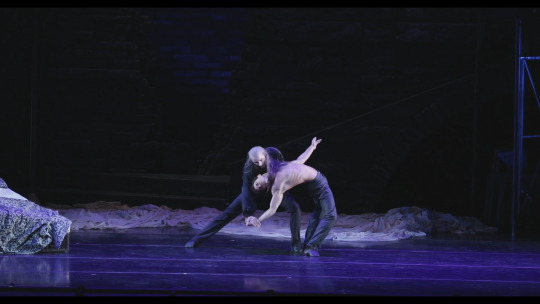
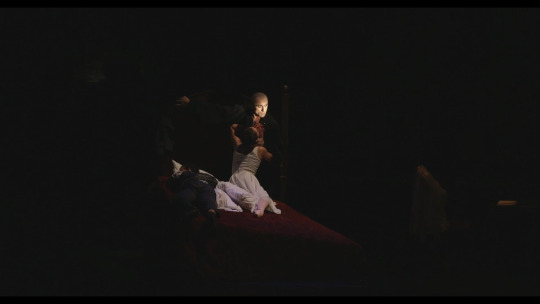
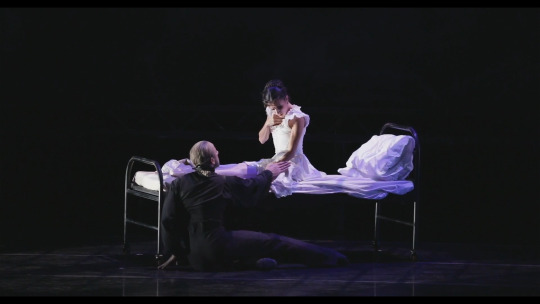
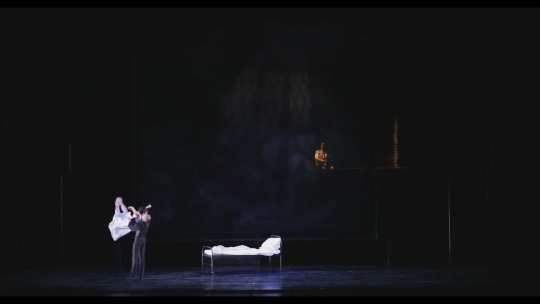
and here's the link:
i have a few thoughts but I'm hiding them under the tag in case anyone might want to watch it and go in completely blind. either way do yourselves a favor and go watch it!
i love the cool blue light for the vampires. I think I usually associate them with red so the blue was a nice change
love the brides. love how they usually are en pointe vs most other characters usually aren't. love their clothes
i like all the costumes actually
obsessed with dracula's entrance and him moving his arms like bat wings and just in general him acting very bat-like
LOVE dracula and jonathan's pas de deux. if I could I'd draw them i would.
actually the first act as a whole is so so good
the fact that jonathan walks with a cane is very cool. it would've been so easy to undermine his trauma a little, especially with the fact that it's a ballet. but no, dracula really does look scary and threatening. i just wished they kept it for a little longer.
jonathan being the first to see dracula is also great
the fact that lucy goes en point the moment she sees dracula hdhdhhdh
and tries to play it off like nothing happened :((
van helsing, seward (or is it quincey? he looks a little texan lmao) and arthur dancing over minas deathbed :(((
hello renfield!!
hello renfield dancing with his hands tied!!!!
it was quincey morris omg hii
mina and dracula pas de deux!! everytime the count is on stage is just so cool to watch
are those the people dracula killed?? idk but I love them
the fight. are you kidding me.
74 notes
·
View notes
Text
What a climax.
Very tense and suspenseful. I read on TV Tropes that it's been pointed out the climax isn't a showdown between the Heroes and The Big Bad, it's the heroes rushing to defuse a bomb before time runs out. The attention paid to the position of the sun, the chase, the obstacles in their path, getting to Dracula, the triumph on his face as he sees he's almost won, then Jonathan and Quincey strike. And Jon hurling Dracula's crate off the wagon and Quincey's foe-tossing charge through Dracula's mooks! Thrilling!
But sometimes victory requires sacrifice. And Quincey P Morris, our bold American, our brave cowboy, paid the price. Yet he dies knowing his life was well spent, evil is vanquished, Mina is free. I'm not generally given to quoting scripture, but for Mr. Morris: "For a man hath no greater love than he lay down his life for his brother," or in this case, sister.
Rest in peace, Mr. Morris. Give Lucy a hug and a kiss from all of us.
25 notes
·
View notes
Note
(foaming) childhood friends to holiest lovers
Question: is this about Marcille and Falin dungeon meshi, or Mina and Jonathan Dracula?
Answer: IT'S BOTH!
In the Gothic, love and romance is a driving force moved by suffering. This suffering by virtue influences the notions of love in the way of intense emotions that fundamentally change, and evolve characters in a gothic story. Most of the time circumstances outside of the characters' hands drive this suffering into told, or untold emotions which are pushed towards the very edge of thematic sanity.
Mina is [redacted], then is cast outside of god's light even if she was just a victim of a more powerful being, Falin gets eaten by the Red Dragon even if she saved Laios in the process. Both women seem to be thematically "punished" to set a possible point of No Return in the narrative now that they are active driving forces for the other characters, specifically, their beloveds.
What makes a gothic love holy? What makes it the Holiest? Is it feelings? Actions? Or maybe it is the dramatic drive to see how the human mind responds to the suffering of someone that you hold dear inside your heart. Wouldn't you move heaven and hell to save her? Wouldn't you offer your neck to her if her final fate was to turn into a monster? Would you grab her hand and go into the dark with her as you reject the very real god, or would you spit on the laws of natural death and drag her back to the living.
It's such a good choice to make because it takes such a simple concept like devotion, and turns it around by making one of the two promise/commit an act that is afront to the laws of existance in a lot of ways... for love. Simple, unaltered, powerful, burning, destructive love. Jonathan swears to Mina that he will sacrifice himself to her, and condemn his soul to hell if she turns into a vampire since his very being is hers alone; Marcille stabs her staff drenched in dragon blood into the ground, and sings a forbidden chant to revive Falin from her bones. Jonathan blantantly refuses god's light, and declares Mina the Holiest of them all amid their suffering; Marcille tenderly washes the dragon blood off Falin's body as she stands utterly unperturbed by her actions because Falin means the world to her.
Both of them see the fate of their beloved written on the wall, and say no, she will not die. It doesn't matter what, or who I have to defy so I can save her, I will do it.
Yet, at the same time, it's almost like they are choosing the option that would cast the most heaviest guilt upon Mina, and Falin. How would Mina feel if she found out that Jonathan thinks of his life so low? Would Falin be content to see Marcille be branded as a wanted criminal because of her use of black magic? However... they are childhood friends, they know each other... They probably know.
The melodramatic and the Gothic are certainly inscribed as latent possibilities in sentimentalism: in contradistinction to sentimentalism they require, perhaps, an insistence on the threat to virtue posed by a strongly personified villain, or principle of villainy, and a heightening of the obfuscation of virtue by various narrative devices, namely peripety and deceit. David J. Denby, (1994). Sentimental Narrative and the Social Order in France.
It's sad that Dungeon Meshi doesn't really focus on Falin's feelings after the shock of Marcille reviving from her very bones settles in her driven narrative, and it is speculative to tell that in Dracula Mina is aware of Jonathan's devotion to her, but simply chooses to not mention it in case of her religious, and mental breakdown gets worse. But deep down they do know, if they didn't then... Their love wouldn't be as strong, as gothic.
Isn't it beautiful? Isn't it holy? To love like this.
#What a way to signal that the author (whenever intentional or not) understands the actual lenght of love#Romance in the Gothic asks the question of what happens to people when they devote to a love that borders on desctructive#Because let's be honest Marcille and Jonathan cross a border that could be seen as destructive#Marcille in the sense of her outer world that surrounds her#And Jonathan in his inner thoughts that guide his actions#dungeon meshi#marcille donato#falin touden#farcille#dracula daily#dracula#dracula daily spoilers#mina murray#jonathan harker#jonmina
34 notes
·
View notes